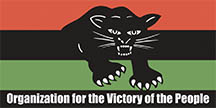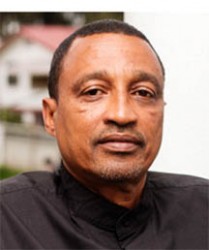Campaigning behind the symbol of the striking panther, the Organization for the Victory of the People (OVP) wants citizens of Region Four to know that it is going to make sure that there are no more decisions made without their input.
OVP will be contesting the regional elections only in Region Four at next Monday’s elections. It has endorsed the APNU+AFC coalition for the general elections.
 OVP leader Gerald Perreira told Stabroek News that the decision to endorse the coalition for general elections came as a result of on the ground observations. “If you read the ground, the mood on the ground from all the areas that we go to, [it says] that the people want a change; they want the PPP regime out and the major force right now that is capable of removing the PPP regime at the ballot box is APNU+AFC,” Perreira said.
OVP leader Gerald Perreira told Stabroek News that the decision to endorse the coalition for general elections came as a result of on the ground observations. “If you read the ground, the mood on the ground from all the areas that we go to, [it says] that the people want a change; they want the PPP regime out and the major force right now that is capable of removing the PPP regime at the ballot box is APNU+AFC,” Perreira said.
The party has, however, decided not to join the coalition because beyond defeating the PPP, the aims and objectives of the OVP and APNU+AFC are very different. “Even if the coalition wins, they will simply be new managers of a system that has failed Guyana and many other post-colonial societies. There will be changes but those changes will not go to the core of our problems, real change will come when we shed this neo-liberal ideology,” Perreira asserted.

Hoping to target mostly the dispossessed, no matter their race or faith, OVP acknowledges that since it is trying to reclaim former president Forbes Burnham’s legacy and continue his vision, certain sections of the electorate will ignore it.
Towards this end, Perreira asserts that OVP will continue to go into the communities and advocate for the involvement of all peoples. Further, as a Pan-Africanist, Perreira said he is particularly committed to representing the members of marginalised African communities.
Perreira is not comfortable being described as a politician. The politician, he said, is in the business of telling you whatever you want to hear to get your vote and disappearing after elections. “We are political activists… we will advocate to put power and wealth in the hands of the people,” he added.
Perreira is a known Pan-Africanist, political activist, educator, writer and commentator. He was a central executive member of the Young Socialist Movement, the youth arm of the PNC, and political assistant to the former Minister of Education Jeffrey Thomas under the Burnham-led PNC government. He lived and worked for many years in Libya, where he lectured at the Green World Institute, and was a founder and executive member of the World Mathaba, based in Tripoli, Libya.
He said while the OVP seems new, it is not; it has existed as the Guyanese Resistance Movement, the Joint Initiative for Human Advancement and Dignity (JIHAD) and Black Consciousness Movement Guyana (BCMG). As JIHAD, the organisation had since 2003 protested against the marginalisation of the African people in Guyana and the “phantom” death squads that were terrorising communities.
Perreira explains that after he and his wife were publicly implicated in the disappearance of several weapons from the Guyana Defence Force, they were forced to leave Guyana for their own safety. Though never charged with a crime, he felt it was in the best interest of him and his family to leave. Having returned in 2013, he said he now intends “no matter the results of the elections, to continue to work with all Guyanese who are dedicated to the realization of a truly independent and sovereign Guyana which can bring justice and prosperity to all citizens.”
‘Decentralised to the masses’
He asserted that the major political parties often call for citizens to vote for them at elections then exclude them from decision making. “The OVP has a revolutionary democratic approach,” Perreira, however, declared.
This approach will be used if it becomes part of the regional government of Region Four. It includes the establishment of people’s committees, where people can actively participate in the decisions that affect their lives. “[We will be] putting power in the hands of the people through the establishment of people’s committees and assemblies, so that their interest could be better communicated to the Regional and central government. This will be done to break up the existing power system so that power can be decentralised to the masses,” he explained.
One particular policy change he hopes to institute is public-owned enterprises. “If we break away from this neo-liberal model, then the government would be free to invest in industry and manufacturing,” he said.
He differentiated between state-owned and public-owned enterprises by stating his belief that the public should have a share in the institutions they patronise. “The state,” he said, “has to get into strategic sectors of the economy so that they can not only offer varied employment but also earn revenue to facilitate social welfare programmes, such as pensions for the elderly, assistance to families in need, quality free education, healthcare and other public services. These funds can also be used to pay public servants a livable wage.”
OVP specifically hopes to address income inequality in Region Four. “Funds allocated for Region Four must be used to benefit all residents of the Region and not a select few. There will be zero tolerance for corruption and misuse of funds,” the OVP manifesto asserts. The six-page document also notes that employment will be created through infrastructure spending, development of manufacturing industries and assistance for small businesses and cooperatives.
It also promises to apply pressure from Region Four against the plunder of the country’s natural resources nationwide by corporate foreign predators who have been allowed to take what they want and give us nothing or little in return. Claiming that the list of products Guyana can offer the world is endless, OVP promises to develop a strong manufacturing structure throughout Region Four. “We will begin to put in place measures that prevent, where possible, the export of raw materials, emphasising a value added ‘made in Guyana’ approach,” it adds.
The OVP will also be supporting initiatives to legalise marijuana for personal use so that the current laws, which they claim to be “absurd,” are no longer used to criminalise a large section of our youths.









